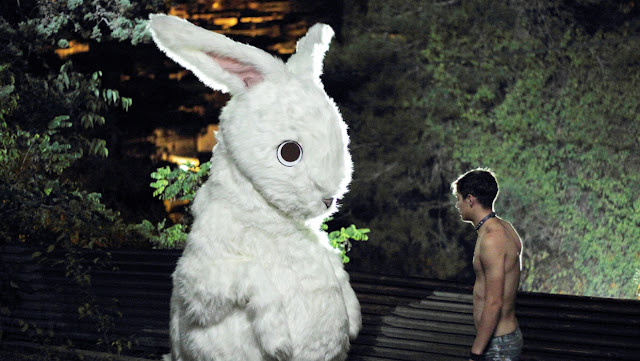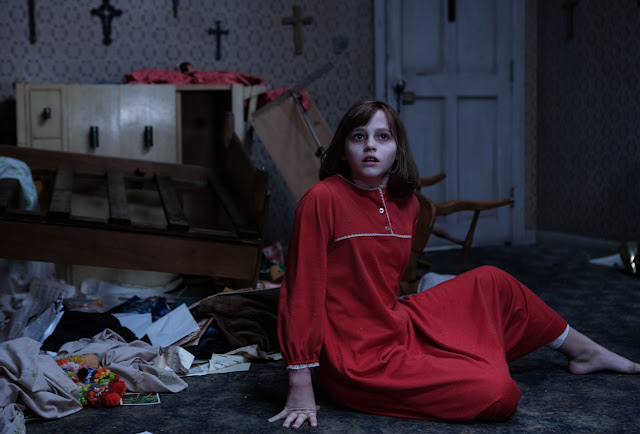"A
compelling odyssey through modern Greece by two brothers in search of their
father.”
Two Greek-Albanian brothers embark on a cross-journey quest
in search of their father in Xenia,
the fourth feature from Greek director Panos H. Koutras. In this Greece’s
official entry for the Best Foreign Language Film at the 88th Academy Awards, the brothers’ road trip turns out to be a visual expository of
homosexuality, xenophobia and racism in a country who is struggling to keep its
head high amidst hostilities and economic upheaval.
The film begins with a near-blowjob episode for Daniel or
Dany (Kostas Nikouli), a 15-year-old gay who is flamboyantly styled with
bleached blond hair swept over one eye, pierced septum and funky clothes. An
older man is about to go down on him but Dany, childishly sucking a lollipop,
stops him and asks him for some dough. His Albanian mother, Jenny, has just
died and he decides to move away from Crete and visit his brother in Athens.
Dany also plans to search their father Lefteris (Yannis Stankoglou),
frequently referred to as “the Nameless,” who left them when he was still two.
Odysseas or Ody (Nikos Gelia) is working in a sandwich store
when he spots Dany outside the shop. Two years older, golden-voiced,
broad-shouldered and handsome, Ody is devastated to hear about their mother’s
death. Reluctantly, he agrees to accompany Dany. With a few cash and Dany’s pet
bunny Dido, the brothers journey together to Thessaloniki to reunite with
their Greek father in the hopes of getting his nationality, staying in Greece
and sharing part of his wealth. Along the way, they reconnect with Tassos
(Aggelos Papadimitriou), an old friend and one of Jenny’s ex-lovers who is now
living with a male partner. While Ody unleashes his balladair’s voice in an
audition for a popular television talent show, Dany gets into trouble playing
his well-hidden gun.
Xenia is an
engrossing and eye-opening road movie. Partly gay and partly coming-of-age, the
film is mostly uneven and passionately long, yet its depiction is genuine and
heart-warming and its emotions are raw. Its story is too familiar and
simplistic for a two-hour-long running time; however, the characters, their
chemistry, their clashing yet protective fraternal tie and their mutual
quandaries are too compelling and riveting to ignore.
Dany is the more intriguing personality as he skates between
being childish and adorable to unhinged and unpredictable. Being an adolescent gay,
it is apparent that he is still piecing his life, evident with how he mixes and
matches his looks. He may still be unsure of what he wants to do with his life
or his behaviors are too erratic and outlandish but one cannot help but admire
Dany’s courage and recklessness. He is gay and proud, open and daring, and
loyal and defensive. Yet, such attitudes also make him vulnerable to abuse and
bullying.
There is also an underlying nuance of sexual tension between
the brothers, mostly on Dany’s part. His habit of carrying a white bunny around
and his fetish to hairy chest are suggestions of Dany’s overfull sexuality.
There are boys who momentarily distract Dany but the movie occasionally goes to
some uncomfortable moments between them, like when Dany surreptitiously glances
at Ody who is undressed and when they get drunk and crazily danced together.
Yet, the movie is cautious and sensitive enough to stop before their
relationship becomes incestuous.
Other than celebrating homosexuality and individuality, the
feature also touches myriad social issues, particularly those relating to
immigrant rights, racial discrimination and patriarchy. The plight of the
brothers is also juxtaposed with the uncompromising realities of modern Greece
in the face of economic downturn. The film’s title, a Greek word for “hospitality,”
could refer to the nation’s tentative acceptance of immigrants such as the
half-Albanian siblings. It can also allude to the abandoned hotel, a depressing
sight mirroring the country’s economic landscape, which gives the protags
shelter during their journey. Whichever, the film essentially speaks about one’s
recognition of his personhood, family and destiny.
The two young actors, both newcomers in the time of filming,
are both remarkable and devoted, holding the screen with ease and charm. Gelia
is more low-key and subdued but his moments of tenderness and silliness are
well-observed. Nikouli is confident and he effortlessly channels the fantasies
and volatility of a gay teenager.
Xenia is a
predictable drama of brothers searching for their father. Yet, the characters
are charismatic and their plight is absorbing enough to warrant its long
running time. Likewise, it is an enlightening journey to contemporary Greece
distressed with economic and social issues.
Production companies: 100% Synthetic Films,
Wrong Men, MPM Film, Entre Chien et Loup, Arte France Cinema
Cast: Kostas Nikouli, Nikos Gelia, Aggelos
Papadimitriou, Romanna Lobach, Marissa Triandayllidou, Yannis Stankoglou, Patty
Pravo
Director: Panos H. Koutras
Screenwriters: Panos H. Koutras, Panagiotis
Evangelidis
Producers: Eleni Kossyfidou, Panos H.
Koutras, Alexandra Boussiou
Director of photography: Helene Louvart,
Simon Sarketzis
Production designer: Pinelopi Valti
Music: Delaney Blue
Costume designer: Vassilis Barbarigos
Editor: Yorgos Lamprinos


























0 comments:
Post a Comment